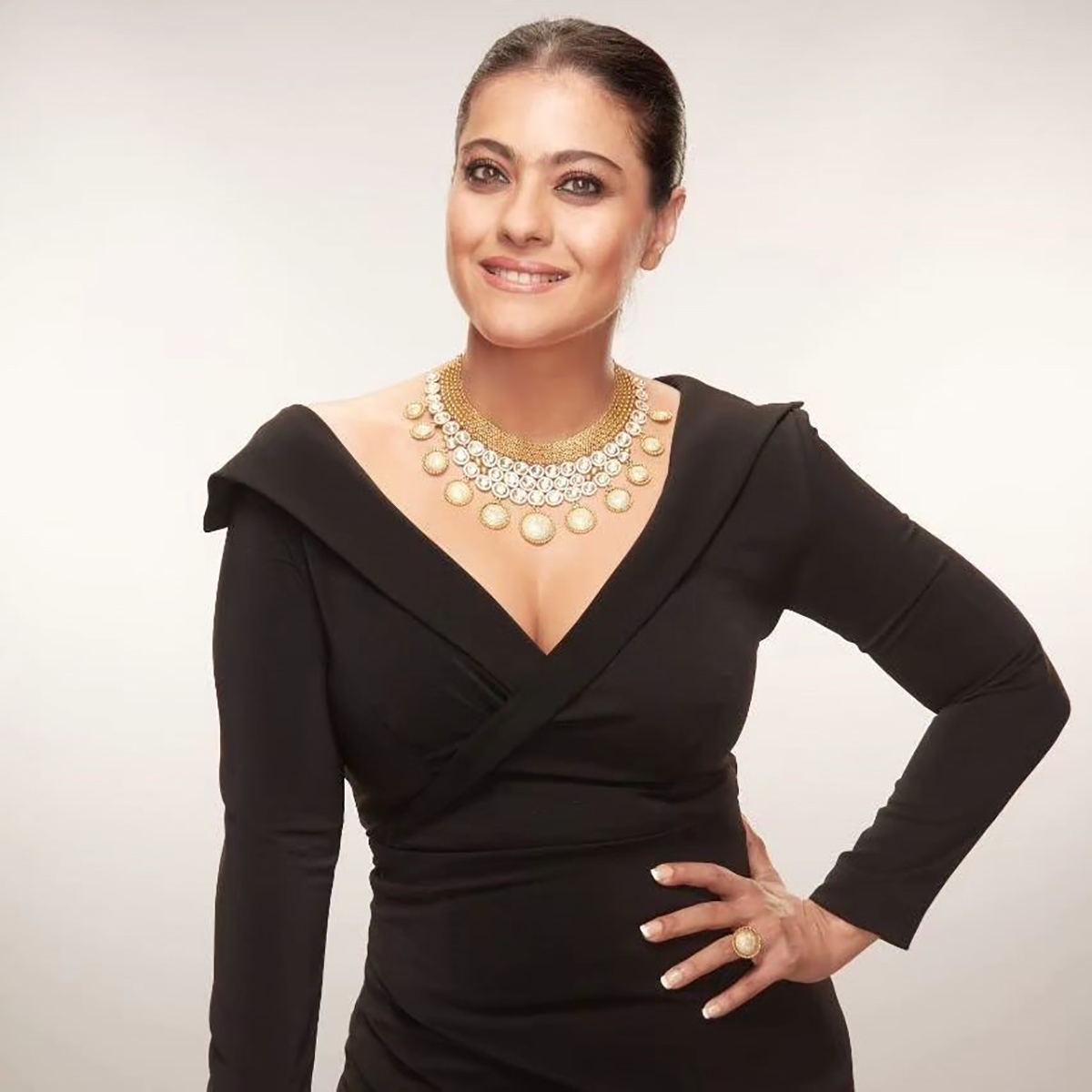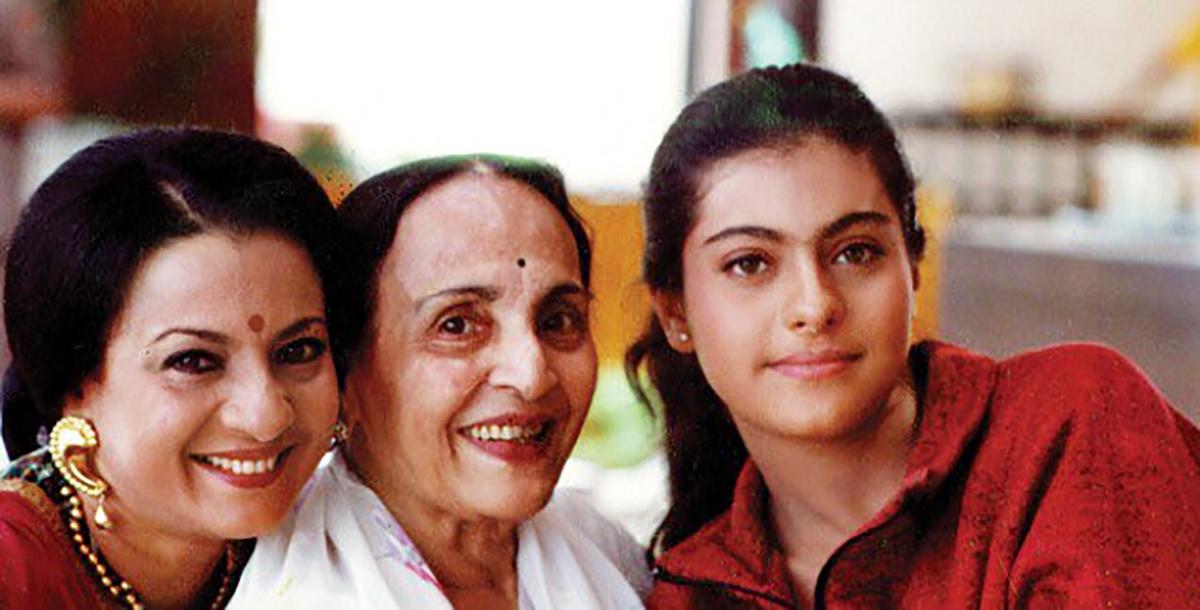If there's one thing the full-of-beans star knows, it's how to stay happy, observes Dinesh Raheja.

Kajol has some striking commonalities with her late aunt, the renowned actress Nutan, though their families have long been estranged.
At 24, Kajol was scaling the giddy heights of success, four months after scoring a blockbuster Kuch Kuch Hota Hai, when she thumbed her nose at naysayers and had a love marriage with Ajay Devgn in 1999. Cupid, in her book, didn't follow a calendar.
Similarly, 23-year-old Nutan had got married to Rajnish Bahl in 1959, the very same year as her landmark triumphs, Anari and Sujata.
Continuing to defy conventional Bollywood groupthink, Kajol went on to star in major successes (Kabhi Khushi Kabhie Gham, Fanaa) even after marriage and motherhood.
This too harks back to her maasi Nutan whose career had flourished (Bandini, Milan) even after the birth of her son, Mohnish Bahl.
Aunt and niece both hold a record-breaking five Filmfare Best Actress Awards.

Cinema is in Kajol's very bloodstream.
She is a worthy successor to her mother Tanuja, aunt Nutan and grandmother Shobhana Samarth's acting legacy.
Her father, director Shomu Mukherjee, also belonged to an illustrious film family going back to patriarch S Mukherjee of Filmalaya studios.
Joy Mukherji is Kajol's uncle while Ashok Kumar and Kishore Kumar are her granduncles.
The mischievous sparkle in her eyes is inherited from her mother Tanuja known for her livewire roles.
A naughty, boisterous child, Kajol was the ringleader among her group of kids, which included sister Tanisha and cousin Rani Mukerji.
Kajol's definitive personality trait has always been her confidence.
'I'm not nervous of talking to anybody,' she had said.
This helped the harum-scarum 16 year old with thick eyebrows and an undeveloped fashion sense land her debut film, Bekhudi (1992) which flopped.
The success of her second film Baazigar (1993) made Kajol a star though she was nether breathtakingly beautiful nor a sensational dancer.
As Karan Johar once said, 'Her face dances more than she does but that is itself a pleasure to watch.'
What Kajol had in her corner was undeniable talent and a felicity for expression. She did not just act out her scenes and deliver her lines in Baazigar; she inhabited her character.
Kajol subscribed to none of the behavioural clichés heroines are famous for.
She hated scratchy wigs and didn't care for elaborate dressing up (paradoxically, she loved reading gothic romances) and claimed to detest having her eyebrows threaded.
Here was an anomaly in glamour-obsessed Bollywood. But the movie camera loved her, as did the audience.
Like her character in Yeh Dillagi (1994), Kajol's screen persona also underwent a dramatic makeover and the rough edges were smoothened out, courtesy Karan Johar, Manish Malhotra and Mickey Contractor.
But Kajol became a sensation not because of her designer outfits; but for her extraordinary ability to communicate with the audience.
She could expunge all signs of her natural vivacity and convey emotional vulnerability through her expressive eyes as in Dilwale Dulhaniya Le Jayenge (1995) in which she famously pleads with her domineering father 'Kya aap meri khushi ke liye meri apni zindagi se mujhe ek mahina bhi nahin de sakte hai?'
DDLJ is the longest-running film (28 years) in Bollywood history and it consolidated the Kajol-Shah Rukh pairing as the most popular in recent times.
While Baazigar and Karan Arjun saw their passion short-circuited by a desire for revenge, Shah Rukh and Kajol worked best in sunnier, brightly-lit romances like their other youth epic Kuch Kuch Hota Hai (1998) in which they again played soulmates perennially circling around each other.
To her credit, Kajol accomplished top-level stardom, not by being a meek trend follower but by being staunchly individualistic.
Though she adamantly steered clear of art cinema, she was the first to dare to put the grrr in girl playing a murderess in Gupt (1997).
And she gave an insight into a traumatised woman who has been unable to prevent the rape and murder of her twin sister in Dushman.
Kajol did take artistic risks.
In Dilwale Dulhaniya Le Jayenge, when an inadvertently drunk Kajol wakes up to find herself in Shah Rukh's bed, she bursts into hysterical sobs whereas in Dil Kya Kare (1999), her character has a no-strings one-night-stand with Ajay Devgn.
Kajol was at the peak of her career and had just had a rare hat-trick of hits (Pyaar Toh Hona Hi Tha, Kuch Kuch Hota Hai and Hum Aapke Dil Mein Rehte Hain) when she decided in 1999 to get married to Ajay Devgan, whom she had been dating for five years.
It's a marriage of opposites.
Ajay is the strong silent type while Kajol is effervescent.
Yet, they successfully celebrated the silver jubilee of their marriage this February.
Kajol refused to hit the brakes on her career after marriage unlike the time-honoured tradition followed by Jaya Bhaduri and Mumtaz or even Madhuri Dixit and Juhi Chawla.
She rose even further with Kabhi Khushi Kabhie Gham (2001) for which she won her third Best Actress Filmfare Award.
The actress did take a break after delivering a baby girl Nysa to concentrate on her upbringing.
A five-year-long hiatus later, Kajol achieved something most heroines have failed at -- a post-baby comeback as the leading lady of a hit big-budget extravaganza.
Kajol also bagged the Best Actress award for this film ,Fanaa (2006), and proved that she was still salsa-hot.
She did films on her own terms, like Ajay Devgn's directorial debut U Me Aur Hum, another award-winning role in My Name Is Khan, as a terminally-ill mother in We Are Family and, at the age of 41, a grey-shaded role in her seventh teaming with superstar Shah Rukh: Dilwale.
Kajol has hit 50, and in today's Hindi film world, that is the new 35.
Her recent roles like Helicopter Eela and Salaam Venky were met with a lukewarm response but she has pivotal roles in as many as four films on hand: Maharagni with Prabhudeva, her home production Maa, Sarzameen with Prithviraj and Do Patti with Kriti Sanon.
These films will decide Kajol's future status within the industry.
But those who know Kajol are not too worried.
If there's one thing the full-of-beans star knows, it's how to stay happy.
| Year | Film | Leading Man |
|---|---|---|
| 1993 | Baazigar | Shah Rukh Khan |
| 1994 | Yeh Dillagi | Akshay Kumar, Saif Ali Khan |
| 1995 | Dilwale Dulhaniya Le Jayenge | Shah Rukh Khan |
| 1997 | Gupt | Bobby Deol |
| 1997 | Ishq | Ajay Devgn |
| 1998 | Pyar Kiya Toh Darna Kya | Salman Khan |
| 1998 | Dushman | Sanjay Dutt |
| 1998 | Pyar Toh Hona Hi Tha | Ajay Devgn |
| 1998 | Kuch Kuch Hota Hai | Shah Rukh Khan |
| 1999 | Hum Aapke Dil Mein Rehte Hai | Anil Kapoor |
| 2001 | Kabhi Khushi Kabhie Gham | Shah Rukh Khan |
| 2006 | Fanaa | Aamir Khan |
| 2010 | My Name Is Khan | Shah Rukh Khan |
| 2015 | Dilwale | Shah Rukh Khan |
Photographs curated by Satish Bodas/Rediff.com